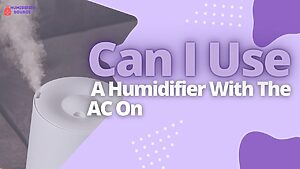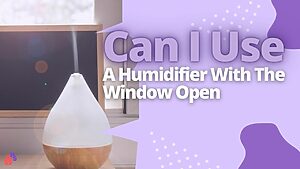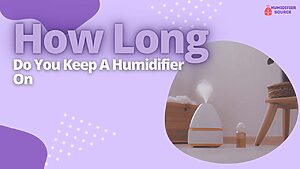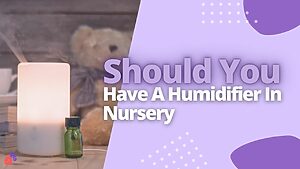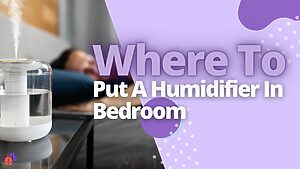Yes, you can sleep with a humidifier and a fan. The humidifier and fan will help circulate the air and keep you cool.
However, you should keep a few things in mind when using a humidifier and a fan simultaneously.
Key Takeaway’s
- Yes, you can sleep with a humidifier and a fan.
- Humidifiers and fans both help to improve air quality and circulation.
- Sleeping with a humidifier and fan can help to reduce congestion, dryness, and snoring.
- It is important to ensure that the humidifier is set to the correct setting and that the fan is just a short distance from the bed.
- Be sure to clean the humidifier regularly to prevent mold growth.
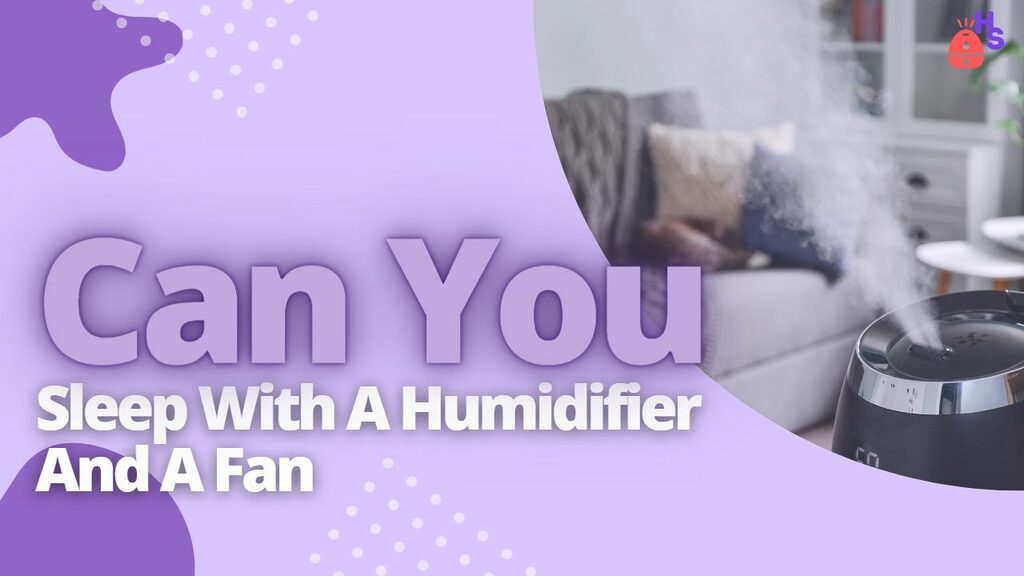
Here’s The Answer To Can You Sleep With A Humidifier And A Fan
Yes, you can sleep with a humidifier and a fan. Doing so has many benefits, including reducing the risk of dehydration, improving the quality of your sleep, and relieving congestion.
Dehydration is a common cause of sleep problems. Your body loses water while you sleep as a result of sweating and breathing.
This can lead to wakefulness and disturbed sleep. By hydrating your skin and adding moisture to the air, a humidifier can be helpful.
It’s important to choose the humidifier that best meets your needs because there are numerous varieties available. Some factors to consider include the size of the unit, the type of mist it produces, and whether it has a built-in fan.
A Humidifier Is A Device That Adds Moisture To The Air By Releasing Water Vapor

A humidifier is a machine that releases water vapor into the air to add moisture. This can be accomplished using various methods, including ultrasonic technology and steam.
Humidifiers are often used in homes to treat dry skin, nosebleeds and other conditions caused by low humidity levels in winter weather.
They’re also used to prevent dryness in the air, which has been shown to cause breathing problems such as asthma attacks among people with allergies or other respiratory issues.
A Fan Is A Device That Blows Air
A fan is an air-blowing machine.
- It cools the air by blowing it around.
- It keeps you cooler in hot weather and warmer in cold weather.
- It helps to circulate air throughout a room.
You Can Sleep With A Humidifier And A Fan If You Want To
A humidifier emits cool mist, usually more comfortable than air at higher temperatures.
But suppose the humidifier is blowing directly on you or the other people in your household. In that case, it can get uncomfortable and make breathing difficult.
If this happens, move away from the humidifier until it calms down or turns down its setting so that it emits less steam.
If you use a fan with your humidifier, make sure that:
- The fan isn’t blowing directly on you or anyone else (use a remote control if possible)
- The fan isn’t blowing directly on the humidifier (the air coming out of it should be cool rather than hot)
The Humidity Level In Your Room Will Affect How Comfortable You Are While Sleeping
You can measure the humidity in your room with a hygrometer, which you can find at most hardware stores or on Amazon.
The ideal level is between 30 and 50 percent—if it’s too low, you’ll wake up feeling dry and dehydrated; if it’s too high, you might feel like you have a cold.
Humidity also affects your skin—if it’s too low, your body will produce more oil to compensate for the lack of moisture in the air; if it’s too high, this excess oil will clog pores and lead to breakouts.
Additionally, humidity levels affect breathing: when there isn’t enough moisture in the air (a condition known as “dry air”).
If The Humidity Is Too Low, Your Skin May Become Dry And Irritated
The best thing about having a humidifier in your room is that you can sleep with it running and not worry about waking up in the morning with dry, itchy skin.
When there’s enough moisture in the air, your body doesn’t have to work as hard to keep itself hydrated.
That’s why many people who live in arid climates use humidifiers as part of their daily routine—it keeps them from waking up feeling parched or irritable.
What Are The Benefits Of Using A Humidifier?
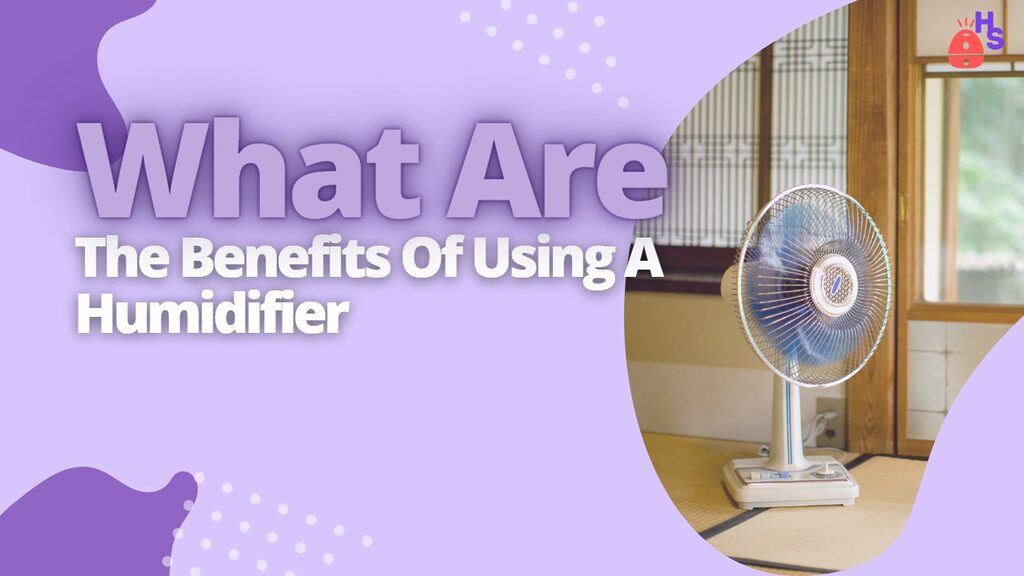
- Helps you sleep better.
- Helps you breathe better.
- Helps you avoid dry skin and eyes.
- Helps you avoid dry sinuses, which can be painful and cause headaches and other issues.
Are There Any Risks Associated With Using A Humidifier?
When it comes to humidifiers, there are a few risks you should be aware of:
- Use caution when using a humidifier. While the benefits outweigh the risks in most cases, you want to keep an eye on how much water vapor your humidifier puts off and ensure that you’re not putting yourself or others at risk.
- Keep your water level low. Make sure that when using a humidifier, you don’t fill it up too high, so water spills onto any surfaces around it, as this can cause damage or mold growth if left unchecked for extended periods (plus, who wants their floor getting wet?). Also, keeping an eye on your filter helps prevent clogging and other issues caused by excess buildup.
- Check the filter regularly for signs of mold growth or damage due to improper maintenance practices, like neglecting to clean out old filters before replacing them with new ones every few months’ worth of use instead of just once per year.
How Can I Use A Humidifier And Fan Together Safely?
The answer is simple: don’t.
You should never do this. It’s a bad idea, and here’s why:
- First of all, the humidifier will get wet from the mist of your fan. This could cause it to overheat or even catch on fire! The last thing you want is for your house to burn down because you wanted to sleep with a cool breeze around your head all night long (or because you wanted to wake up with dry lips).
- Second of all, using both devices at once will make noise—a lot of noise! While some people find the sound soothing when they go to sleep in front of their favorite TV show or movie on Netflix, others may find it annoying enough that they don’t fall asleep at all; instead, they’ll lie awake listening as their ears ring like an off-key carousel horn being played right next door.
In Summary
The post discusses how using a humidifier and a fan together can be beneficial in terms of providing relief from congestion and other issues.
Additionally, the author provides tips on how to use both devices safely and effectively.
Overall, using a humidifier and a fan together can help improve your breathing, relieve congestion, and prevent dryness.
Just be sure to follow the safety guidelines provided by the manufacturer to avoid any accidents.
Frequently Asked Questions
Will the humidifier make the room too cold?
Actually, the humidifier will make the room warm enough. Most humidifiers produce a moist, cool mist that can help cool you down while sleeping.
Will the fan dry out my skin?
No, the fan will not dry out your skin. Humidifiers usually have a built-in fan that cools you down and also moistens the air.
How often should I change the water in my humidifier?
Some humidifiers need the water to be changed every day, while others might only need to have the container emptied once a week. It is up to the humidifier’s manufacturer.
What type of fan is best to use with a humidifier?
Two types of fans can be used with humidifiers: manual and automatic. Manual fans use your energy to cool you down, while automatic fan humidifiers rely on a built-in fan to cool the air and moisten your skin.
Author
- The Right Way To Fill A Humidifier: Hot Or Cold Water?
- Humidifier And AC: Is It A Match Made In Heaven?
- Can I Use A Humidifier With The Window Open (Solve Your Dilemma)
- Perfect Air Quality: How Long To Run Your Humidifier
- Should You Have A Humidifier In Nursery (The Surprising Benefits)
- Humidifiers In Bedrooms: A Guide To Good Placement



